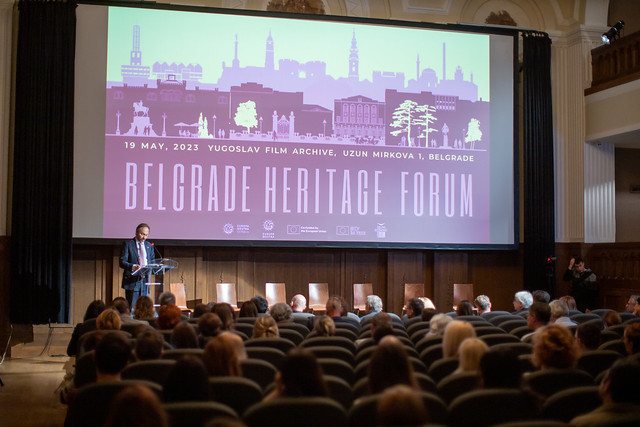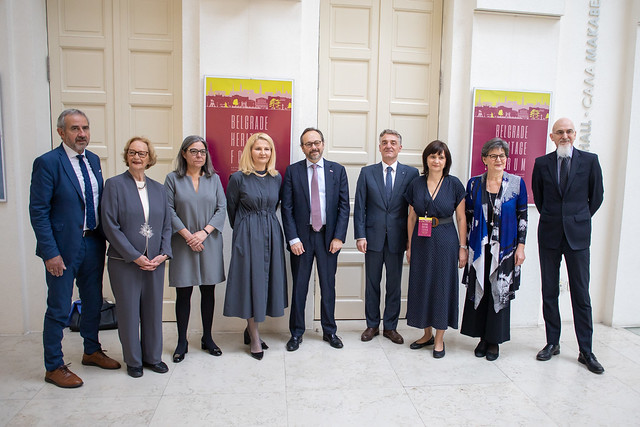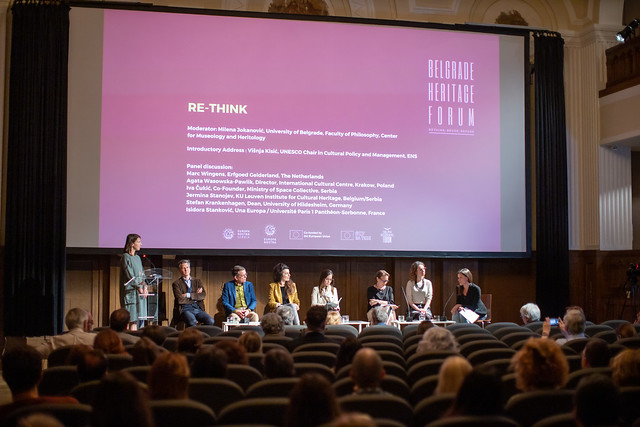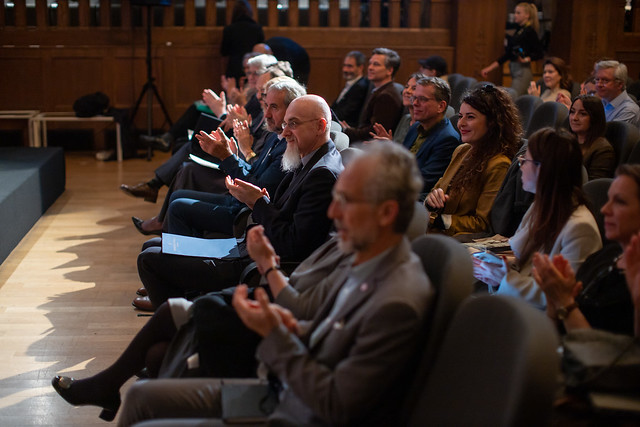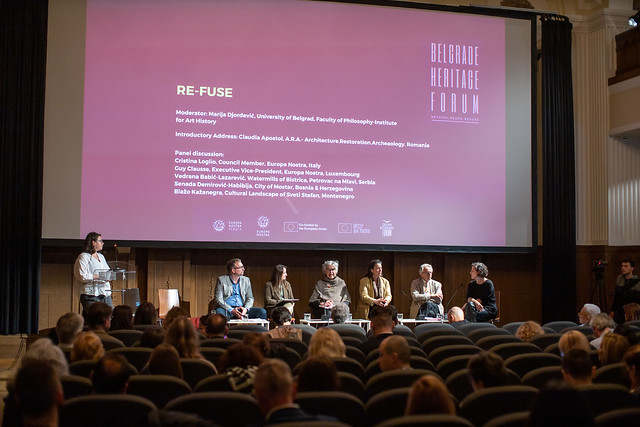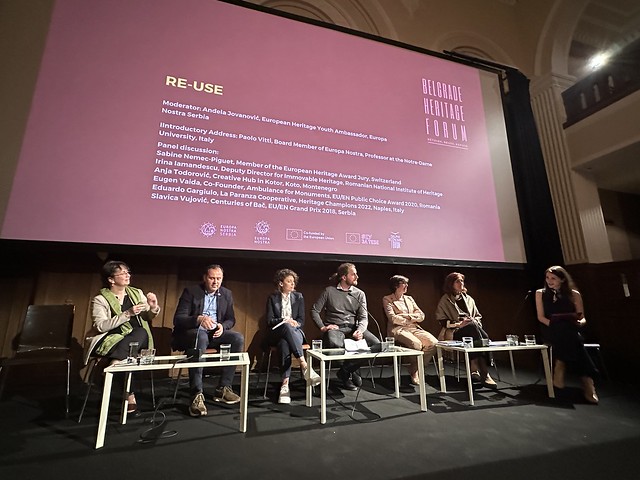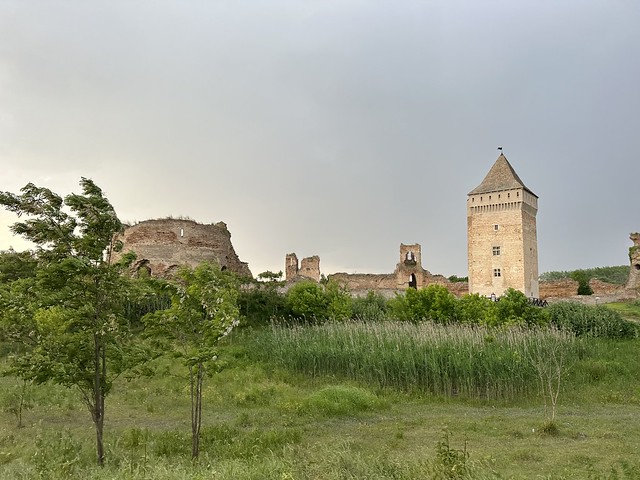Belgrade Heritage Forum establishes a new encounter space for heritage actors across the Balkans and the rest of Europe
The first edition of the Belgrade Heritage Forum took place successfully on 19 May, organised by Europa Nostra Serbia in close coordination with Europa Nostra and with the support of the European Commission, the Delegation of the European Union to Serbia and the Delphi Economic Forum. Around 150 participants came together in the iconic Yugoslav Film Archive to put heritage at the very centre of Europe’s green and social transformation.
The Belgrade Heritage Forum launches at a challenging time for Europe. All across the continent, communities are faced with threats to peace and democracy, social inequality and climate change. While the field of cultural heritage is heavily impacted by these challenges, it is also part of the solution. Throughout three engaging panels entitled RE-THINK, RE-FUSE and RE-USE, over 40 speakers at the Forum showcased existing contributions and the huge potential of heritage to help create a more peaceful, inclusive and sustainable Europe.
The opening session had an impressive line-up of speakers, including Emanuele Giaufret, Ambassador of the EU to Serbia; Luca Gori, Ambassador of Italy in Serbia; Pierre Cochard, Ambassador of France in Serbia; Tobias Flessenkemper, Head of the Belgrade Office of the Council of Europe; Tanja Miščević, Minister of European Integration in Serbia; Ksenija Zelenović, representing the Yugoslav Film Archive; Irina Subotić, President of Europa Nostra Serbia; and Hermann Parzinger, Executive President of Europa Nostra. The session was moderated by Sneška Quaedvlieg-Mihailović, Secretary General of Europa Nostra.
Emanuele Giaufret, Ambassador of the EU to Serbia, outlined the potential of heritage to mitigate tensions and prevent conflicts and called for the need to protect and promote what unites us: “Cultural heritage is a link to our past, history and values and a bridge towards next generations. We must and will use it to set the foundation for a better and more tolerant future.”
On behalf of Europa Nostra, Executive President Hermann Parzinger raised the immense value of cultural heritage to Europe’s integration and transformation: “The perennity and resilience of the European project cannot be achieved without giving due importance to the corpus of our shared values and to the safeguard of our shared cultural heritage, the source of our sense of togetherness.”
RE-THINK, a critical review of heritage values
The first panel RE-THINK included an inspiring exchange which questioned the values and role of heritage as we transition to a more sustainable and inclusive future. Participants held an inspiring discussion which went straight to the core of heritage: Is it something more than an essential component of our multiple identities, our sense of place and sense of belonging and more than the expression of local, regional, national and/or European uniqueness? Is it more than an educational, social and economic resource? Will we manage it better if we re-think its role, if we re-imagine the intersection between cultural heritage, the Sustainable Development Goals (SDGs) and climate action and treat it as a commons?
The opening remarks were given by Višnja Kisić, UNESCO Chair in Cultural Policy and Management, Europa Nostra Serbia, an impressive and most inspiring speech: “If we really want a liveable future, we cannot go ahead by ghettoising some parts of reality as heritage, justifying destruction of all that is not. We cannot treat heritage only as abstract values because we live in a world of material conditions and material consequences. We cannot treat heritage as a human thing only because cycles of inheritance, knowledge transfer and memory happen across species. How we understand and practice heritage must be radically transformed”.
Milena Jokanović, University of Belgrade, Faculty of Philosophy, Center for Museology and Heritology, moderated the session which counted with the participation of Marc Wingens, Erfgoed Gelderland; Agata Wasowska-Pawlik, Director, International Cultural Centre; Iva Čukić, Co-Founder, Ministry of Space Collective; Jermina Stanojev, KU Leuven Institute for Cultural Heritage; Stefan Krankenhagen, Dean, University of Hildesheim; and Isidora Stanković, Una Europa / Université Paris 1 Panthéon-Sorbonne.
RE-FUSE, addressing our common challenges
The second panel RE-FUSE seeked to address the biggest threats and challenges our cultural heritage movement faces today. As such, participants exposed and reflected upon several cases of endangered heritage in South-East Europe, including several 7 Most Endangered sites.
An inspiring introductory address was given by Claudia Apostol, architect and representative of A.R.A.- Architecture. Restoration. Archeology, a Romanian NGO which was awarded the very first Costa Carras European Citizens Award for the Safeguard of Endangered Cultural and Natural Heritage for its exemplary work mobilising citizens to promote and protect the outstanding heritage of Roșia Montană, located in Transylvania.
Marija Djorđević, University of Belgrade, Faculty of Philosophy-Institute for Art History, moderated the session which counted with the participation of Cristina Loglio, Vice-President, Europa Nostra; Guy Clausse, Executive Vice-President, Europa Nostra; Androulla Vassiliou, Former European Commissioner and Vice-President of Europa Nostra; Vedrana Babić-Lazarević, representative of the Watermills of Bistrica (Serbia), a 7 Most Endangered Site 2023; Senada Demirović-Habibija, representative of the Partisan Memorial Cemetery in Mostar (Bosnia and Herzegovina), a 7 Most Endangered Site 2023; and Blažo Kažanegra, representative of the Cultural Landscape of Sveti Stefan (Montenegro), a 7 Most Endangered Site 2023.
RE-USE, a journey through best practices
The third panel RE-USE exposed award-winning examples of best practices with regard to heritage-led regeneration. The session was introduced by Europa Nostra’s Board Member, Paolo Vitti.
Moderated by Anđela Jovanović, European Heritage Youth Ambassador, Europa Nostra Serbia, the panel included several winners of the European Heritage Awards / Europa Nostra Awards, as well as members from the Jury. Speakers included Sabine Nemec-Piguet, Member of the European Heritage Award Jury; Irina Iamandescu, Deputy Director for Immovable Heritage, Romanian National Institute of Heritage; Slobodan Radovanović, Creative Hub in Kotor; Eugen Vaida, Co-Founder, Ambulance for Monuments, Public Choice Award winner 2020; Eduardo Gargiulo, La Paranza Cooperative, 2022 award winner in the category Heritage Champions; and Slavica Vujović, Centuries of Bač, 2018 Grand Prix winner in the category Conservation.
Introducing the European Heritage Hub
The Belgrade Heritage Forum concluded with a special closing session on the European Heritage Hub – A Way Forward. As the moderator of the panel, Sneška Quaedvlieg-Mihailović, Secretary General of Europa Nostra, introduced the new European Heritage Hub, a two-year pilot project bringing together heritage stakeholders and movements across Europe to support the transition towards a more sustainable, innovative and inclusive society. The project, funded by the European Union, is formed by a consortium of 20 partners led by Europa Nostra.
Speakers included Jacek Purchla, Vice-President, Europa Nostra; Andrew Potts, European Heritage Hub & Climate Heritage Network; Bruno Rossignol, European Investment Bank Institute; Tatjana Cvjetićanin, Balkan Museum Network; Marshall Marcus, Secretary General, European Union Youth Orchestra; and Sneška Quaedvlieg-Mihailović, Secretary General, Europa Nostra.
The Forum highlighted many extraordinary existing examples carried out across the heritage world to advance the green, social and digital transformation. Participants underlined that the true value of the European Heritage Hub will be to establish a permanent advocacy and knowledge platform to connect these many innovative initiatives across the sector and reinforce the relevance of cultural heritage as a strategic resource for the future of Europe.
The Belgrade Heritage Forum will be held annually, establishing a much-needed encounter space for heritage professionals, activists and decision-makers from all over Europe.
Europa Nostra in Belgrade
Europa Nostra was in Belgrade on 17-20 May to mark its 60th Anniversary this year and celebrate the launch of the European Heritage Hub. Over the course of four days, around 60 members of the Europa Nostra delegation held inspiring discussions, visited treasured heritage sites, enjoyed powerful concerts, and attended engaging debates across the city.
This programme in Belgrade was organised by Europa Nostra in close collaboration with Europa Nostra Serbia with the support of the European Commission, the Delegation of the European Union to Serbia and the Delphi Economic Forum.
